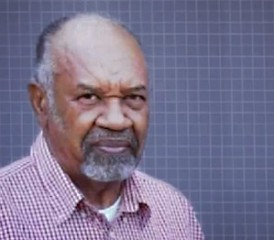Navy Veteran, Mesothelioma Survivor Benefits from Surgeon’s Personal Approach
Stories from SurvivorsWritten by Tim Povtak | Edited By Walter Pacheco

Sydney R. never heard a sales pitch like this before, and certainly never expected it from a renowned, big-city thoracic surgeon who was trying to convince her wavering grandfather with pleural mesothelioma that his life could be saved, or at least extended.
“If you’re a fighter, I’ll fight alongside you every step of the way,” Avi Lebenthal, M.D., told her grandfather, Odell R., in his office that day. “And if you’re not a fighter, then why are you even here?”
It sealed the deal.
Odell is a proud and loyal, 20-year U.S. Navy veteran with a burning streak of independence. Lebenthal is a decorated, former infantry unit commander from the Israeli Army with a penchant for going above-and-beyond to help other veterans.
It didn’t matter that Odell lived on a 40-acre tree farm in rural Mendenhall, Miss., and Lebenthal worked 1,500 miles away in traffic-choked Boston in the VA Health Care System.
In the doctor’s office that day, they bonded like brothers.
Surgery Was Key Treatment
Odell, 74, is now a mesothelioma survivor, back on his tractor (against doctor’s orders) and regularly perusing the farm just four months after a complex, 12-hour surgery that removed all visible signs of the cancer, along with repairing some unexpected cardiac complications.
“I come from a health care background. I’m in the industry, but I never heard a doctor talk like that before, really straightforward, and right to the point,” Sydney said. “My grandfather liked that. He says what’s on his mind, too. It really convinced him what he had to do.” Their last name is being withheld over privacy concerns.
Odell initially declined a trip to Boston to consult with Lebenthal about potential surgical options. Although Sydney had made the preliminary arrangements with the help of Missy Miller at the Mesothelioma Center, the plan was falling apart when Odell refused repeatedly to take a phone call from Lebenthal’s staff.
Odell Originally Given Little Hope
The local VA office already had told Odell he had only 6 to 9 months to live, and there was little to be done beyond palliative chemotherapy. He scoffed at the thought of multiple trips to Boston.
That’s when Lebenthal called him personally, and they spoke the first time.
“It was the doctor’s personal touch, his interest, the way he spoke, that really did it. Not many surgeons will do something like that, but he had looked at my grandfather’s records, and he took a real personal interest in him,” she said. “For that, I’m very grateful.”
VA Health Care Worked Well
Odell was the beneficiary of the VA Health Care system, which gives veterans the option to travel anywhere for specialized care, which Lebenthal provides for veterans. The VA also helps provide travel and lodging assistance, often with assistance through The Mesothelioma Center.
He spent 20 years in the Navy, serving as a boatswains mate and an electrician on several ships. He worked in the Norfolk and Mayport shipyards. He also later served as a fireman and an electrician.
His exposure to asbestos, which causes mesothelioma, likely came throughout his working years, both during and after his military service.
The first sign of any serious health problem didn’t come until late in 2012. Even in his 70s, he always was active: Walking the farm, doing chores, tending to the horses and cows, along with the trees and the crops. He and his wife raised both Sydney and her younger sister.
“You couldn’t ever get him to sit down,” Sydney said. “That’s just the way he was, always moving, always working on something.”
It was a strange shortness of breath and sudden lack of endurance that caught the attention of his family. He was diagnosed first with high blood pressure, then with fluid on his lungs. Then a lung collapsed, and he nearly died. He eventually was diagnosed in March with malignant pleural mesothelioma, which no one had expected.
Find a Specialist
Mesothelioma is a rare, complex cancer, and the few doctors he saw in nearby Jackson, Miss. rarely had seen it, and none had treated it effectively. They originally wanted to send him to Birmingham, Ala., but the more Sydney learned about the disease, the more she understood how much he needed someone like Lebenthal who treated it regularly.
“I would tell anyone diagnosed, or their family, to look beyond where they normally would for treatment. There are experts out there who can treat this disease, but you have to find them,” she said. “You can’t just accept what the first doctor tells you.”
Odell has been back to Boston once for a follow-up after returning home from surgery. Much of his aftercare has been handled locally, but still coordinated with Lebenthal, who has talked to him several times since. He recently finished another round of chemotherapy, which left him feeling less than himself, but hopeful that he can return to a normalized life.
“Boston and all that traffic was a little overwhelming. And my grandfather says he didn’t like the food much, but we were treated so well. Originally, we were told he wouldn’t see another Christmas,” Sydney said. “But that has changed since surgery.
“He’s out walking again, trying to regain his strength. He’ll be out cutting grass. The doctor doesn’t want him on the tractor yet, but he’s been there already. He’s not going to sit for very long.”




